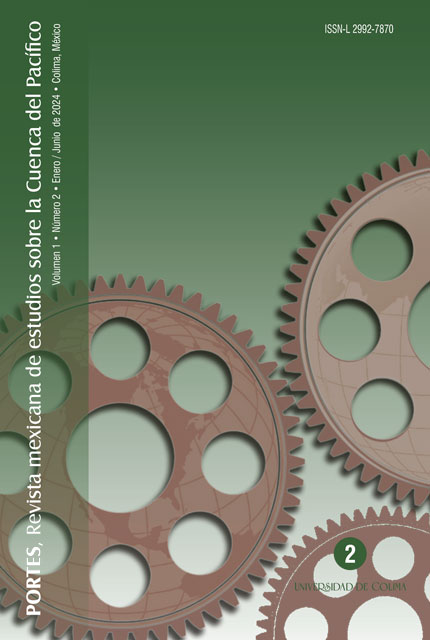Japón, Corea del Sur y la OTAN: desafíos comunes a la distancia
DOI:
https://doi.org/10.53897/RevPortes.2024.02.06Palabras clave:
OTAN, Seúl, Tokio, China, amenaza, Ucrania.Resumen
El presente artículo explora la relación entre la Organización del Tratado del Atlántico Norte con Japón y Corea del Sur. La presencia de la OTAN ha estado limitada en general a Europa y al Atlántico Norte y ha permanecido constante desde los conflictos en Irak y Siria, sin embargo debido a la invasión de Rusia a Ucrania, la Organización después de más de veinticinco años tiene nuevamente un conflicto cerca de sus miembros. En este sentido, dado el tamaño de Rusia, la percepción de amenaza no solamente se ha limitado a Europa, ya que en Asia la invasión de Rusia a los vecinos de China, particularmente Corea del Sur y Japón les ha causado alarma ya que el éxito de Rusia podría incrementar la asertividad de China. La OTAN no consideraba a China como una preocupación hasta 2022, por lo cual el papel de Tokio y Seúl como aliados cobra una gran relevancia.
Descargas
Métricas
Citas
Bacon, P., Burton, J. (2017). NATO-Japan relations: Projecting strategic narratives of “natural partnership” and cooperative security. Asian Security, 14(1), 38–50. doi:10.1080/14799855.2017.1361730 DOI: https://doi.org/10.1080/14799855.2017.1361730
Burton, J. (2017). NATO’s “Global partners” in Asia: Shifting strategic narratives. Asian Security, 14(1), 8–23. doi:10.1080/14799855.2017.1361728 DOI: https://doi.org/10.1080/14799855.2017.1361728
Chaban, N., Bacon, P., Burton, J., Vernygora, V. (2017). NATO Global Perceptions – Views from the Asia-Pacific region. Asian Security, 14(1), 1–7. doi:10.1080/14799855.2017.1361726 DOI: https://doi.org/10.1080/14799855.2017.1361726
Gardner, H. (2016). NATO expansion and US strategy in Asia: Surmounting the Global Crisis. Palgrave Macmillan.
Hemmer, C., & Katzenstein, P. (2002). Why is There No NATO in Asia? Collective Identity, Regionalism, and the Origins of Multilateralism. International Organization, 56(3), 575-607. doi:10.1162/002081802760199890 DOI: https://doi.org/10.1162/002081802760199890
Kosuke, T. (2023, Mayo 6). Japanese Prime Minister Kishida’s visit to South Korea: 3 points to watch. The Diplomat. https://thediplomat.com/2023/05/japanese-prime-minister-kishidas-visit-to-south-korea-3-points-to-watch/
Kosuke, T. (2023, Julio 3). Will Japan and South Korea issue A new joint declaration?. The Diplomat. https://thediplomat.com/2023/07/will-japan-and-south-korea-issue-a-new-joint-declaration/
Kuo, M. A. (2023, Febrero 28). South Korea and NATO: Seoul’s strategic calculus. – The Diplomat. https://thediplomat.com/2023/02/south-korea-and-nato-seouls-strategic-calculus/
Mi Terry, S., Orta, K. (2022, June 30). South Korea’s important achievement at the NATO Summit. Wilson Center. https://www.wilsoncenter.org/article/south-koreas-important-achievement-nato-summit
Ministry of Foreign Affairs. (1998). Japan-Republic of Korea joint Declaration: A new Japan-Republic of Korea Partnership towards the Twenty-First Century. MOFA. https://www.mofa.go.jp/region/asia-paci/korea/joint9810.html
Nazemroaya, M. D. (2012). The globalization of NATO. Clarity Press.
Vohra, A. (2023, Julio 24). NATO has its sights set on Asia. Foreign Policy. https://foreignpolicy.com/2023/07/24/nato-has-its-sights-set-on-asia/
Descargas
Publicado
Cómo citar
Número
Sección
Licencia
Derechos de autor 2024 Universidad de Colima

Esta obra está bajo una licencia internacional Creative Commons Atribución-NoComercial-CompartirIgual 4.0.
La revista PORTES de la Universidad de Colima se distribuye bajo una Licencia Creative Commons Atribución-NoComercial-CompartirIgual 4.0 Internacional





